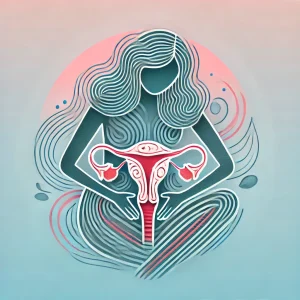ADHD and Your Period: Navigating Hormonal Changes
Table of Contents
Toggle
ADHD and Your Menstrual Cycle: Riding the Monthly Rollercoaster
Imagine being on an emotional rollercoaster that changes speed and direction every few days. For many women with ADHD, this isn't just a metaphor—it’s their monthly reality. From puberty to menopause, fluctuating hormones can intensify ADHD symptoms, making each phase of your cycle feel like a new set of challenges.
If you’ve noticed your ADHD symptoms worsen right before your period or if you feel unusually focused and productive at certain times of the month, you’re not alone. Hormones play a significant role in ADHD, and understanding this connection can be a game-changer in managing your symptoms.
As Dr. Lotta Borg Skoglund explained in an ADDitude webinar, "From puberty to menopause, naturally cycling females will experience quite dramatic fluctuations of circulating sex hormones affecting both how we feel and how we function." Grasping this relationship can help you better understand why your ADHD may feel different throughout the month and how to work with it, not against it.
The Science of ADHD and Hormones: A Delicate Dance
Hormonal fluctuations throughout the menstrual cycle impact ADHD symptoms in ways that can feel both frustrating and surprising. Estrogen, the hormone that helps regulate mood, energy, and attention, rises and falls throughout your cycle, directly affecting how your ADHD manifests.Estrogen: The ADHD-Friendly Hormone
Estrogen boosts dopamine levels in the brain, which improves focus, mood, and energy—all areas affected by ADHD. However, as estrogen levels shift, so do your ADHD symptoms.- Follicular Phase (Days 1-14): As estrogen rises, you might notice improvements in focus, mood, and energy. This is often the best time for tackling complex tasks or creative projects.
- Ovulation (Day 14): Estrogen peaks during ovulation. While this can improve focus, it may also increase impulsivity due to heightened reward-seeking behaviors. As noted in the Multiple Hormone Sensitivity Theory and referenced by Dr. Skoglund, "The rapid rise in estrogen leading up to ovulation can increase risk-taking and reward-seeking behaviors."
- Luteal Phase (Days 15-28): As estrogen drops and progesterone rises, many women experience what some refer to as the "luteal letdown." This is when ADHD symptoms such as forgetfulness, mood swings, and low energy can worsen. One woman in a recent study described it as feeling like a “regression,” saying, "When your period comes again, you’re like, ‘Oh my God, my brain is not working as well as it was’."
Progesterone: The Wild Card
While estrogen generally helps improve ADHD symptoms, progesterone can have the opposite effect. During the luteal phase, rising progesterone levels can lead to irritability and emotional sensitivity, which may make it harder to manage ADHD symptoms.Challenges with Menstrual Health Management (MHM)
ADHD doesn’t just complicate daily life; it can also make managing menstrual health more challenging. For many women with ADHD, the experience of being caught off-guard by their period is incredibly common. One participant in a study explained, "Even though my period was regular, it would still be a surprise to me, every single time." This experience can add a layer of stress, especially when it involves forgetting to change menstrual products or struggling to prepare ahead of time. Managing both ADHD and menstrual health can feel overwhelming, with executive function being compromised by ADHD symptoms at a time when organization and planning are crucial.Healthcare and Support: A Knowledge Gap
Despite these challenges, many women with ADHD find that healthcare providers lack awareness of how hormonal fluctuations affect ADHD symptoms. During an ADDitude webinar, Dr. Lotta Borg Skoglund pointed out that understanding how hormones affect ADHD is essential, yet under-discussed: "There is a gap in knowledge regarding how ADHD symptoms change with fluctuating hormone levels." This gap often leaves women feeling unsupported in conversations about how their ADHD interacts with their cycle. One study participant expressed frustration, saying, "I feel like I’ve not had the most comforting experiences with bringing up ADHD to my doctors...I need to tiptoe a little bit, even asking for information." Another shared how a healthcare provider dismissed her concerns by suggesting her symptoms were simply due to motivation issues. These encounters highlight the need for more education in the medical field about the connection between ADHD and reproductive hormones. Many women are left to navigate these challenges without sufficient support, which adds to their feelings of frustration and isolation.ADHD, PMS, and PMDD: When Things Get Tough
For many women with ADHD, PMS (Premenstrual Syndrome) and PMDD (Premenstrual Dysphoric Disorder) can make an already challenging situation feel even more difficult. Hormonal shifts during the luteal phase often intensify ADHD-related issues like anxiety, forgetfulness, and mood swings.- PMS: Symptoms of PMS—such as irritability, low energy, and brain fog—can feel even more pronounced when paired with ADHD.
- PMDD: Women with ADHD may also be more prone to PMDD, a severe form of PMS that causes extreme mood swings and emotional dysregulation before menstruation.
Practical Strategies for Managing ADHD Across Your Cycle
The good news? By understanding how your cycle affects your ADHD, you can implement strategies to navigate these hormonal shifts more effectively.1. Track Your Cycle and Symptoms
Tracking your menstrual cycle and ADHD symptoms can help you predict and prepare for difficult days. Apps like Clue or Flo allow you to log not just your periods, but also your moods and energy levels. This can give you insight into how your symptoms change throughout the month. As Dr. Patricia Quinn notes, "Many women find that tracking their symptoms helps them predict and prepare for challenging days." Once you know your patterns, you can better anticipate and manage fluctuations in your ADHD symptoms.2. Plan Around Your Cycle
Once you have a clearer understanding of how your cycle affects your ADHD, you can adjust your schedule:- Follicular Phase (Days 1-14): This is often when ADHD symptoms are at their most manageable. Use this time to tackle complex tasks, set goals, and plan ahead.
- Luteal Phase (Days 15-28): As symptoms may worsen during this phase, focus on simpler tasks and prioritize self-care. This is not the time to overload your schedule.
3. Adapt Your Environment
Small changes to your environment can make a big difference. Using external reminders like alarms or sticky notes can help keep you on track. During the luteal phase, when brain fog and distraction may be worse, these tools can be invaluable.4. Adjust Medication if Needed
Some women find that their ADHD medication feels less effective during the luteal phase. If this happens to you, it’s important to track your symptoms and discuss them with your healthcare provider. They may be able to adjust your medication dosage or suggest strategies for better symptom management.Be Kind to Yourself
Above all, remember that your ADHD symptoms fluctuating with your cycle is not a personal failure. These changes are part of your biology. As one of my coaching clients shared, "Once I understood the science, I could stop blaming myself for my 'bad ADHD days.' Now, I work with my cycle instead of fighting against it." By tracking your symptoms, adapting your schedule, and seeking support when needed, you can manage the challenges of ADHD more effectively across your menstrual cycle. Understanding the hormonal influence on your ADHD empowers you to work with your body, not against it.- ADHD in Perimenopause: Special Risks of Depression
- Attention Deficit Hyperactivity Disorder and PMDD
- ADHD and Pregnancy: What You Need to Know
References and Research for ADHD and Your Period
- Eng, A. G., Nirjar, U., Elkins, A. R., Sizemore, Y. J., Monticello, K. N., Petersen, M. K., Miller, S. A., Barone, J., Eisenlohr-Moul, T. A., & Martel, M. M. (2024). Attention-deficit/hyperactivity disorder and the menstrual cycle: Theory and evidence. Hormones and Behavior, 158, 105466. https://doi.org/10.1016/j.yhbeh.2023.105466
- Roberts, B., Eisenlohr-Moul, T., & Martel, M. M. (2018). Reproductive steroids and ADHD symptoms across the menstrual cycle. Psychoneuroendocrinology, 88, 105–114. https://doi.org/10.1016/j.psyneuen.2017.11.015
- Bürger, I., Erlandsson, K., & Borneskog, C. (2024). Perceived associations between the menstrual cycle and Attention Deficit Hyperactivity Disorder (ADHD): A qualitative interview study exploring lived experiences. Sexual & Reproductive Healthcare, 40, 100975. https://doi.org/10.1016/j.srhc.2024.100975






